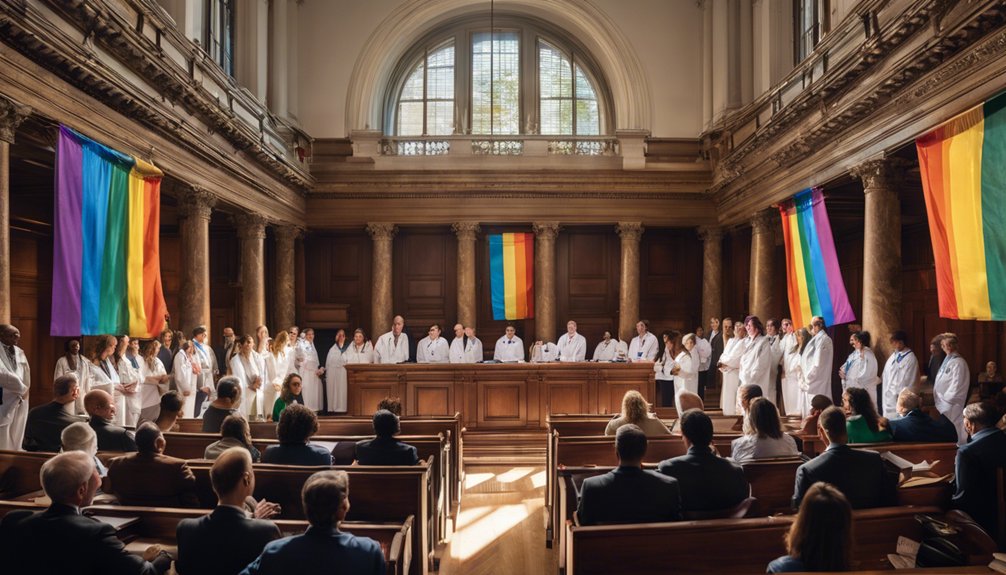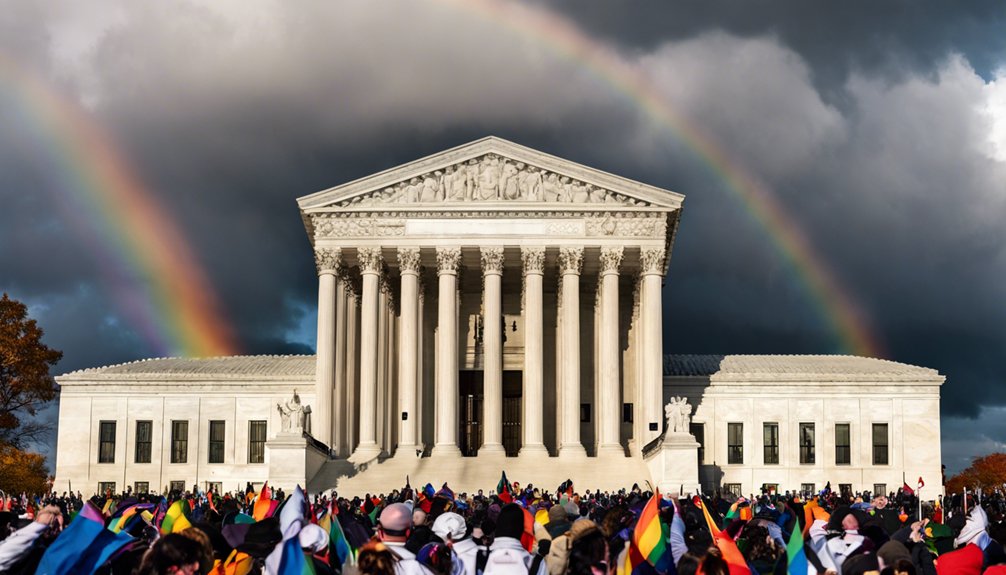Healthcare at a Crossroads: Understanding the Supreme Court’s Trans Rights Case


Table of Contents
ToggleYou’re standing on the brink of a significant moment in healthcare history. The Supreme Court’s decision in U.S. v. Skrmetti could change healthcare rights for transgender youth across the nation. Imagine how a ruling could affect over 300,000 young lives, challenging state bans on gender-affirming care. It’s not just about healthcare; it’s about balancing state power and medical guidance. This case might even ripple into areas like reproductive rights. As these legal battles unfold, you might wonder what this means for the future of healthcare and beyond. Are you ready to investigate the possibilities?
The Supreme Court’s upcoming case, U.S. v. Skrmetti, is a pivotal moment for transgender rights and healthcare access. You’re going to see the Court tackle whether Tennessee’s ban on gender-affirming care for minors violates the Equal Protection Clause of the 14th Amendment. This case spotlights Tennessee’s controversial Senate Bill 1, which prevents transgender minors from receiving puberty blockers and hormones. The state argues these treatments are harmful based on biological sex at birth. However, advocates, including the ACLU, challenge this view, asserting that such bans are discriminatory.
This legal battle reflects a broader national trend. In fact, 25 other states have enacted similar restrictions, affecting the healthcare of approximately 300,000 transgender youths between the ages of 13 to 17 across the U.S. As you consider the implications, understand that the Court’s decision could set a precedent not just for minors, but potentially for adults seeking gender-affirming care as well. The stakes are high, with the ruling having the potential to redefine healthcare rights for transgender individuals nationwide. Keep an eye on how legal precedents, like Bostock v. Clayton County, might influence the Court’s take on sex-based discrimination and healthcare rights.
Imagine being a transgender teen in the U.S. needing fundamental gender-affirming care, but finding yourself in a state that says no. For over 300,000 high school-aged transgender youth, this is a reality. With 39.4% living in states with healthcare bans, accessing necessary treatments is increasingly difficult. These bans, like Tennessee’s Senate Bill 1, prevent you from receiving puberty blockers or hormones, critical for aligning your gender identity. This legislation is being challenged under the Equal Protection Clause of the U.S. Constitution, as it unfairly targets transgender youth.
Access to gender-affirming care is imperative for your mental health. Studies show it greatly reduces anxiety, depression, and suicidality. Without it, you face heightened mental health challenges. Legislative actions across 26 states restrict gender-affirming care, with 22 banning hormone treatments. This legal landscape directly impacts your well-being and future.
Early access to care correlates with improved mental health outcomes, underscoring the significance of maintaining access despite increasing restrictions. As you navigate this complex environment, the Supreme Court’s decision could shape your healthcare rights. The outcome will not only affect your present but also the broader fight for transgender rights nationwide.

You’re witnessing a pivotal moment where state authority is clashing with medical expertise. In the Supreme Court case U.S. v. Skrmetti, Tennessee’s Senate Bill 1 is under scrutiny for banning gender-affirming care for transgender minors. This legislation challenges the medical authority by ignoring the consensus from major medical organizations that these treatments greatly benefit transgender youth, reducing issues like depression and suicidality. Instead, the state insists these treatments are harmful, basing decisions on biological sex at birth.
This legal battle centers around the Equal Protection Clause of the 14th Amendment, questioning whether the state can override medical authority to restrict transgender minors’ access to care. The court’s decision could set a powerful precedent, affecting laws in states beyond Tennessee. With over 300,000 high school-aged transgender youth needing gender-affirming care, and many living in states with similar bans, the implications are vast.
As the conflict between state authority and medical expertise unfolds, it’s essential to recognize a significant overlap with reproductive rights issues. The Supreme Court’s trans rights case, U.S. v. Skrmetti, touches on the same principles of bodily autonomy and healthcare access that are central to reproductive rights. Understanding this connection can help you perceive the broader implications for both transgender and reproductive healthcare.
Advocacy groups warn that this case is part of a larger movement against healthcare access. By understanding the links between these rights, you can better grasp the potential impact on issues like abortion and contraception. This connection highlights the importance of defending both trans and reproductive rights in the face of increasing legal challenges.

The Supreme Court’s ruling in U.S. v. Skrmetti is set to have far-reaching implications for transgender rights and healthcare access. If the court decides to apply heightened scrutiny to Tennessee’s ban on gender-affirming care for minors, it could pave the way for stronger legal protections against discrimination. This decision may influence future anti-discrimination laws, potentially invalidating similar bans in 25 other states. Imagine the impact on thousands of transgender youth who face barriers to vital healthcare.
Currently, about 39.4% of the 300,000 transgender high school-aged youth in the U.S. live in states with healthcare bans. This ruling will directly influence their access to gender-affirming care, which research shows considerably reduces anxiety, depression, and suicidal thoughts. The mental health of these young individuals hangs in the balance, making the Supreme Court’s decision critical.
As debates over transgender rights and healthcare continue, the ruling will shape public opinion and legislative actions affecting the LGBTQ+ community nationwide. You can see this case as a turning point, emphasizing the need for healthcare policies that respect and protect transgender individuals’ rights and mental well-being.
You’re wondering why it’s so hard for trans people to get healthcare. It’s mainly due to legal barriers, societal stigma, and a lack of understanding. Laws and bans on gender-affirming care limit access, while some healthcare providers might not be trained in trans-specific care. Furthermore, societal misconceptions and discrimination make it even tougher. Advocating for trans rights and educating others are key steps in improving healthcare access for trans individuals.
Imagine you’re a parent in Tennessee, and your child needs gender-affirming care. Suddenly, a law bans this essential healthcare. That’s what U.S. v. Skrmetti is about. It’s a Supreme Court case challenging Tennessee’s ban on gender-affirming treatments for minors, arguing it violates the 14th Amendment’s Equal Protection Clause. The outcome could affect transgender rights and healthcare access across the nation, impacting countless families just like yours.
You’re curious about the barriers to gender-affirming healthcare. To begin, know that legal restrictions, like state bans, directly block access to necessary treatments. These laws often ignore medical expertise and parental consent. Furthermore, societal stigma and misinformation create hesitancy and fear, discouraging individuals from seeking care. Insurance hurdles also pose significant challenges, as coverage for these treatments can be limited or denied, making access even more difficult for transgender individuals.
You’re at a pivotal moment in history. The Supreme Court’s decision in U.S. v. Skrmetti could redefine healthcare access for transgender youth. Will this ruling open doors for broader protections against discrimination? As you think about the impact on trans rights, consider how it might also influence reproductive rights and healthcare for all marginalized groups. The stakes are high, and the outcome could change lives. Stay informed, because your understanding makes a difference.
 Featured PostsSeptember 17, 2025Beyond Coming Out: Trans Films That Break the Mold
Featured PostsSeptember 17, 2025Beyond Coming Out: Trans Films That Break the Mold News and AdvocacySeptember 16, 2025I Would Consider It: Trump’s Shocking Remark on Banning Pride Flags
News and AdvocacySeptember 16, 2025I Would Consider It: Trump’s Shocking Remark on Banning Pride Flags Trans Q&ASeptember 15, 2025Q&A – I’m Trans. What Do I Do Now?
Trans Q&ASeptember 15, 2025Q&A – I’m Trans. What Do I Do Now? Featured PostsSeptember 15, 2025Seeking Guidance From a Therapist Specializing in Gender Identity
Featured PostsSeptember 15, 2025Seeking Guidance From a Therapist Specializing in Gender Identity